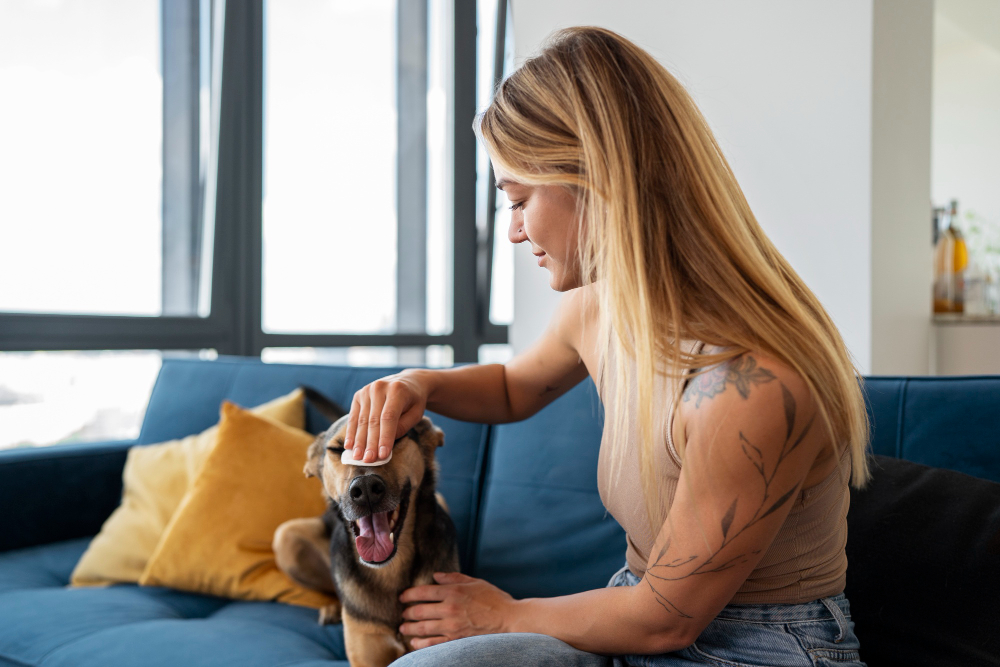Flea allergy dermatitis (FAD) is a common allergic skin condition in dogs caused by an allergic reaction to flea saliva. When a flea bites a dog with FAD, it injects saliva into the skin, triggering an immune response that leads to intense itching, inflammation, and skin lesions. Symptoms of FAD may include excessive scratching, biting, licking, and chewing of the skin, hair loss, redness, irritation, and the development of hot spots or scabs. Recognizing the signs of FAD is crucial for early intervention and effective management of the condition.
Home Remedies for Flea Allergy Dermatitis
While veterinary care is essential for diagnosing and treating FAD, several home remedies can provide relief from symptoms and support the healing process. These home remedies aim to alleviate itching, reduce inflammation, promote skin healing, and prevent flea infestations. By incorporating these natural solutions into your dog’s care routine, you can help ease their discomfort and improve their quality of life.
-
Regular Bathing with Oatmeal Shampoo: Soothing Irritated Skin
Bathing your dog regularly with a gentle oatmeal-based shampoo can help soothe irritated skin, alleviate itching, and remove flea saliva and allergens from the skin and coat. Oatmeal has natural anti-inflammatory properties that can help reduce itching and inflammation associated with FAD. Choose a hypoallergenic shampoo specifically formulated for sensitive skin to avoid further irritation and dryness.
-
Apple Cider Vinegar Rinse: Natural Flea Repellent
Apple cider vinegar (ACV) is a natural remedy that can help repel fleas and soothe irritated skin in dogs with FAD. Dilute ACV with water in a spray bottle and mist it onto your dog’s coat after bathing or between baths. ACV creates an acidic environment on the skin that fleas find inhospitable, making it less likely for them to infest your dog. Additionally, ACV can help restore the skin’s pH balance and reduce inflammation.
-
Coconut Oil Topical Treatment: Moisturizing and Healing
Coconut oil is renowned for its moisturizing and healing properties and can be applied topically to soothe dry, irritated skin and promote healing in dogs with FAD. Massage a small amount of organic, virgin coconut oil onto affected areas of your dog’s skin to provide relief from itching and inflammation. Coconut oil contains lauric acid, which has antimicrobial and anti-inflammatory effects, helping to combat secondary skin infections and support skin health.
-
Flea Comb and Grooming: Removing Fleas and Allergens
Regular grooming with a flea comb can help remove fleas, flea dirt, and allergens from your dog’s coat and skin, providing immediate relief from itching and reducing the risk of flea infestations. Gently comb through your dog’s fur, paying close attention to areas where fleas are most likely to hide, such as the base of the tail, behind the ears, and along the back and belly. Dip the flea comb in soapy water to drown any fleas or flea dirt collected during grooming.
-
Herbal Flea Repellents: Natural Insecticides
Certain herbs and essential oils have natural insecticidal properties that can help repel fleas and soothe irritated skin in dogs with FAD. Herbs such as rosemary, lavender, peppermint, and neem can be infused into a homemade flea spray or added to your dog’s bath water to provide natural flea protection. Essential oils should be used with caution and diluted properly to avoid skin irritation or toxicity in pets. Consult with a veterinarian or holistic practitioner for guidance on using herbal remedies safely and effectively.
-
Dietary Supplements: Supporting Skin Health
Nutritional supplements such as omega-3 fatty acids, vitamin E, and probiotics can help support skin health and reduce inflammation in dogs with FAD. Omega-3 fatty acids, found in fish oil supplements, have anti-inflammatory properties that can help alleviate itching and improve skin barrier function. Vitamin E is a powerful antioxidant that can promote skin healing and reduce oxidative damage. Probiotics support gastrointestinal health and immune function, which can help reduce allergic responses in dogs with FAD.
Providing Comfort and Relief for Furry Friends
In conclusion, treating flea allergy dermatitis in dogs at home requires a multifaceted approach that addresses itching, inflammation, skin healing, and flea prevention. By incorporating natural remedies such as oatmeal shampoo, apple cider vinegar rinses, coconut oil topical treatments, flea combing, herbal flea repellents, and dietary supplements into your dog’s care routine, you can provide comfort and relief for their allergic symptoms. However, it’s essential to consult with a veterinarian for proper diagnosis and treatment of flea allergy dermatitis, as severe cases may require prescription medications or other interventions. With attentive care and holistic support, you can help your furry friend find relief from flea allergy dermatitis and enjoy a happier, healthier life.
